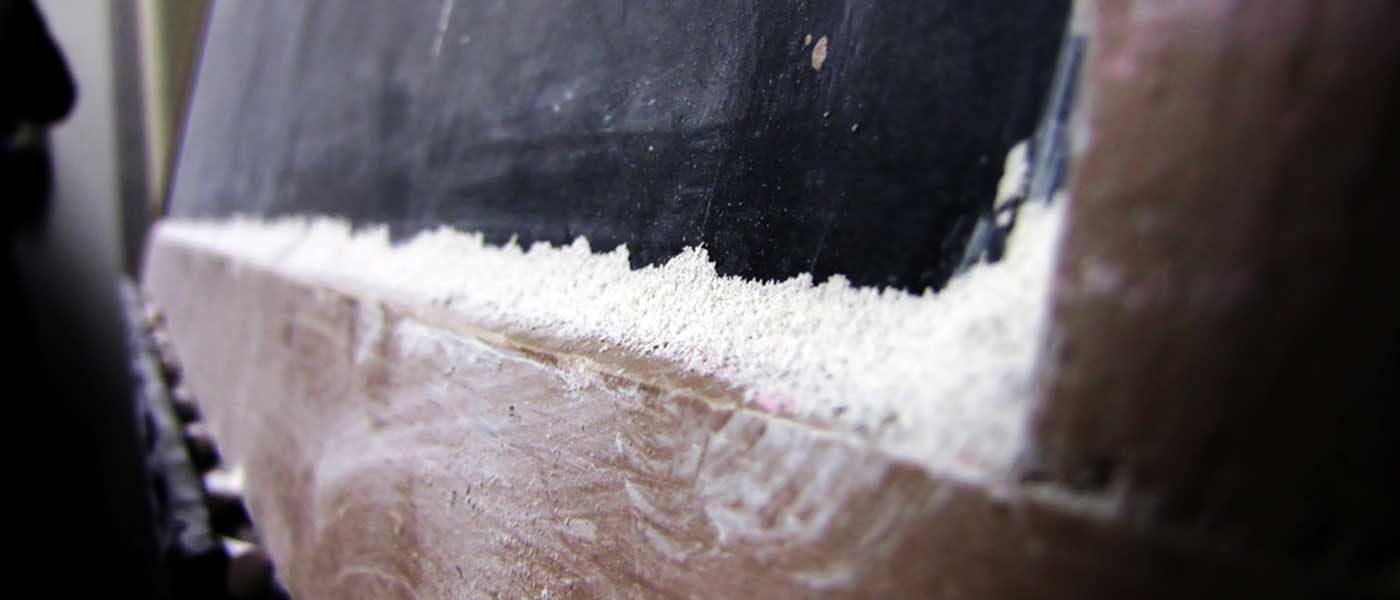In a tiny village in Southern Poland named “Mała,” a Catholic priest sexually abused dozens of underage girls, three of whom I know by heart because we were inseparable as children. “Mała”: tiny. Reflection: insignificant. Rotation: monumental. Dilation: my pupils — the town’s in total darkness. Unlike a storefront at night bathed in fluorescence, the town is as dark as it is inaccessible.
I grew up there and can cheat the victims’ changed names in the newspapers. The two sisters who could never play because they were always cleaning, tending to the garden, or helping raise their younger siblings. The frisky girl who always knew how to get us in and out of trouble.
The one who committed suicide.
I’m in kindergarten for the third year in a row. Not because I cannot roll my r’s or recognize the shapes wrinkles take. With my parents working in the United States, and my grandparents caring for me, my grandmother has no choice but to tug me along to work. Each morning, she drops me off at the unlit end of the hall and ventures to the other to teach 6th-through-8th grade chemistry.
The priest who’s been the town’s priest forever retires. We are to have religion with someone new, and the entire class buzzes with anticipation. Our regular teacher leaves the room at the same time every day, not caring whether the priest has come to replace her, and today is no different. But he does not come.
Taking the opportunity to investigate, I peek around the doorway into a familiar darkness, as if I were pressing my eye too close to a mug loaded with liquid I have just poured. No one. Chamomile relief warm-fills my chest, but my classmates’ encouragement jabs the air-pockets between my ribs. Again and again, I plant one, two, three feet outside the safe zone. No soul, nor a black garb, in sight.
Julita, a girl with red-blonde curls, joins me in my quest. We risk a few steps farther every time and return to the classroom, biting our giggles. The stairs leading to the faculty lounge downstairs hug the middle of the hall, so traversing them to take a look becomes our goal. My legs, roped with adrenaline, feel like mashed fruit.
Julita and I make it downstairs and stand frozen in front of the lounge, unnoticed. The teachers’ fingers engage in coffee-fondue. After a while, the priest’s face expresses acknowledgement of having been spied (as a priest’s face does), and before we have a chance to run, he kills us with his Jack O’ Lantern glare. We scramble back up the stairs.
Later, when he walks into the classroom, tall and proud, he asks who stepped out into the hall. Having not yet denounced the religious need to tell the truth, Julita and I, as well as a handful of our classmates who probably went looking for us while we were gone, lift a hand.
“Against the wall, all of you,” he barks. “Stand up straight, hands above your head.”
Shock sprinkles across my face. Our previous priest was old, eyes abandoned to a train-car window, and seemingly oblivious to our childish misgivings. This man, however, appears young and capable of enjoying the effects of his fierce punishment. He isn’t the priest, as he leaves the parish shortly after I leave for America. But he shows me what priests are capable of, the fear they are capable of instilling, when they are the largest things in the room, the school, the town, even the country.
What do you call nuts on a wall? Walnuts. About seven of us follow his directions, plant our noses in paint and hope they will not grow.
Almost immediately, I begin crying. Not crying, but weeping. In fact, I produce so many tears that they form reserves that feed every confrontation I will have with authority from that day forward, including one time in college when a young male professor will ask me why I am always so sleepy.
My wall-neighbors console me, risking their atonement, but my tears keep falling. With my hands above my head, I am unable to offer my nose a sleeve, so it snorkels so loudly it disrupts class. The priest asks why I’m crying, and I say something vague about my grandmother getting mad. Otherwise, I don’t know. Maybe I actually believe God has the power to punish bad people. Curious children. Maybe I dream he’ll serve me up like Hansel and Gretel.
After school, I walk home with a friend, my grandmother having gotten off early. In the yard, I tell her what happened, expecting her to punish me for getting punished. “It’s OK,” she says. “Just talk to God.”
In high school, the first boy I ever love gets mad when I let a conversation die because I have nothing to say. Embarrassed, my soul sticks its face in a wall and repents. “It’s easy to keep it going,” he says, “Just …”
When I visit my parents, sometimes I watch the dishes pile up in the sink like caged doves. My mother sinks her tired hands into suds. Her face means, “Just …”
Questions about forgiveness.
Kasia and I hate each other in kindergarten. Feisty and mean, her personality defends her abrasive good looks. Older looks. Our teacher notices our dissension and seats us across from one another at a square wooden table in an attempt to forge a bond. With my best friend, Sylwia, next to me, and her best friend, Julita, next to her, we form tiny, resourceful armies, clinging to our miniature collages of anger and disgust.
When Kasia dies six years later, she is no longer an enemy, but an enemy who has committed suicide. Heroic and plentiful. A man-made role in my diary.
My translation of the main news story from Gazeta Wyborza, 2012:
Mała’s Huge Secret
12-year-old Kasia sang in the church choir and always volunteered to clean the church. She was the priest’s eye in the head. When she hung herself, an empty bottle of anxiety pills, which were prescribed earlier by her doctor, no questions asked, lay on the floor.
THE SNAKE BREEDER
“He belongs in hell, not heaven,” says Eve, the mother of Marta and Paulina, two victims in the lawsuit prosecuting priest Roman J for sexual molestation. She agrees to an interview but firmly defends her daughters against journalists.
She welcomes me in the living room, where a portrait of Jesus hangs stoically on the wall. Her formal pants complement a loose white t-shirt.
Priest J. acted as the head priest for Mała’s congregation for ten years. He was just convicted to two years in jail with a suspended sentence for four.
ACCURSED JUDAS
The appeals court in Rzeszόw issued this suspended sentence on June 26, alleviating the verdict posed by the regional court in December, which sentenced him to two and a half years in jail. The whole process is classified. We will not hear the substantiation of both judgments.
Kasia volunteers her love. What happens next does not heaven. What heavens never happened.
After I move to the States, I return to Mała every summer to play with friends whose language doesn’t taste foreign on my tongue and to spend time with my grandparents who, for a long time, feel like my real parents. The summer following Kasia’s suicide, I beg Marta and Paulina to take me to Kasia’s grave, so I can photograph it. I am into photographing everything. Everything, that is, that does not resemble my own body. At the time, I am convinced my body looks how the first whiff of perfume smells: alarming, detrimental to romance, inexcusable for a product.
Back in my kindergarten classroom, several months after the wall incident, the interim priest reads a passage from the Bible about journeying to a faraway place. I’m sitting in the back, several parts of my body braided in conformation to ritual.
“Who here is about to do the same?” the priest asks. By now, everyone knows I’m gearing up to join my parents in America, making his question a pointed one. He looks at me and smirks. Following his lead, my classmates turn to glare at me, jealousy burning, as if I ate their dinner. I blush in shame.
I cannot help but relate my eventual migration to this interim priest’s departure. That I withdraw just as a new era of cool, dominant Catholicism pushes into the town’s nostril. A knife coated in horseradish.
In 2005, Marta and Paulina tell me of Kasia’s suicide in their small, green bunk-bedded bedroom, just off the guest room. I am shocked. Kasia passed in March. Months passed without my being able to experiment with grief, even though I was her kindergarten enemy. News from Poland often totters in my parents’ hands. They like to scope out timing. For example, when I’m in college, they wait to tell me about the death of my paternal grandfather until after a big exam. Because of this, I feel insecure during life’s calmer moments, waiting to hear distressing news from abroad. This time, however, I don’t think they were planning to tell me at all.
Later that summer, I gear up to flirt with the thirteen-year-old version of a kindergarten classmate. Having not seen him in years, I’m able to filter my self-repulsion and cull a handsomeness from his toothy smile and buzzed hair. He finally appears unique from the other two Dawids in our class. The girls and I hang out behind the school on a paved lot seared with sand. They discern my solicitous gaze. “Don’t talk to him,” they warn. “He was close with Kasia and is taking it hard.”
I feel disappointed, as if I expect every charming boy to remain faithful to me (to my what, exactly?) during my hiatuses from Poland every year. The disappointment mixes with my already weak, self-aggrandizing grief to confirm that Kasia’s death, to me as a pre-teen, was nothing more than a drama. I cared more about how her friends were grieving than about how she lived, and how she died. How she committed suicide as a twelve-year-old girl.
Commit suicide. Commit a crime. The newspapers leave only Kasia’s and the priest’s names intact.
“Samobόjstwo” is the word for suicide in Polish. Its prefix, “sam,” means “alone.” English is kinder. Doesn’t flash relationship status.
Priest Roman J. is handsome. During one of my first summers back, when I’m seven or eight years old, he’s suddenly the big figure in town, the one people gush over. He’s young, charismatic, and eloquent. In my experience, if a priest is handsome, it’s either in a class-clown kind of way or a bad-boy kind of way, and Roman J. is the latter. The town finds no trouble visualizing him as God since a person’s attractive appearance, in the context of the church, is godly, created by divine wand. Even the men fall for him. Their dreams about wicked substitutes for faith — women other than their wives, alcohol — are replaced by dreams of being his best friend, of being him.
When my mother visits for my graduation from graduate school, she says, “Your grandmother and I knew something was wrong right away. A charming priest wouldn’t entertain the tiny nothing of a town unless he has committed previous crimes.” This to show he’s a topic of conversation in my family years later, a conversation that began with my mother asking why I refused to attend confession and then undermining her own argument to finally agree with me.
“You’re right,” she says. “The church is a system, and one should only shoulder the unsystematic parts.”
Priest Roman J. is also a motorcyclist, cool and holy, like the fashion trend that causes thousands of girls to sport crosses etched on crop tops. Twice a year, he organizes what directly translates as a “motorcycle jamboree.” Bringing in over 5,000 people and motorcyclists from Lithuania, Ukraine, and Slovakia, the jamboree serves as an unimaginable attraction for the town’s people and hot propaganda for Poland’s southern rim, especially given its Catholic stamp of approval.
As a chain of motorcycles cruises down the main road, my grandparents’ house is still as a tree.
The girls victim to the priest’s unwarranted sexual behavior are around my age. We grow up together, albeit on opposite sides of the world. Kasia commits suicide in 2005. I am confirmed in 2007. The first girl breaks silence about the abuse in 2009. I can only imagine every victim undergoes the sacrament of confirmation during this timeframe, and is confirmed by the man ordained to abuse her.
These beliefs and questions screen confirmation, but air comes through. I am grateful for its existence in a faith caught up in making decisions for people who place their decision-making process in a communal pot. I simply wish it weren’t so young, and forced.
The summer of 2012, seven years after Kasia’s suicide, three years after the first girl breaks her silence about the abuse, on a family vacation in Makarska, Croatia, my cousin and I make it a point to swim out to the buoys several times a day to feel less like cats digging in their litter box.
On one of the buoy swims, far out into the Mediterranean Sea, we overhear a father speaking to his son in Polish. Even though it shouldn’t come as much of a surprise in Europe, hearing this stranger express my backdoor language awakens greed to take part in something I can access. Naturally, we reach for a conversation.
“Where in Poland are you from?” we ask. He responds with a place that’s close to Mała.
“Oh! We’re from Mała,” we say, even though neither of us has lived there for years. My cousin’s family relocated to Germany along with a handful of our parents’ cousins after she was born. But it’s the only place in Poland we are able to connect to when communicating with strangers who speak our language.
“Where the priest molester is,” the father says casually in front of his child, and then, with a smile and wink, “I bet you two are part of his entourage.”
Both of us freeze, which releases our legs from the rather incessant treading we’re committing to keep ourselves alive. Thankfully, the salt water feels sorry and floats below us, cushioning our shock. Languaged genitals to the wind. We attempt to play off the stranger’s apocalyptic comment. “No, no, we don’t …,” but it doesn’t matter because he’s a stranger, and we aren’t elastic enough to accommodate his lack of knowledge about who we are and where we live.
Once we compose ourselves, we swim back to shore to tell our parents what happened. They cannot believe it. We’re in Croatia, for heaven’s sake. Not even newspaper distance.
My cousin is five years younger than I am, beautiful beyond belief, and popular. She’s also my best friend. We’ve spoken before about how lucky we are to not be the priest’s eyes in the head, a luck that has become a gadget for devising guilt. Our age is certainly right. Our femininity. Our knack for over-achievement. And here we are again, in another country, escaping abuse while simultaneously defending ourselves against accusations of having gone through it.
“But his poetics struck me as refreshingly without a will to power, or even a will to perversity. They feel triumphantly wilted, like so many of the flowers…” —Maggie Nelson, The Argonauts
The girl flowers.
The priest composer whose open-church voice transcends the page, real-time registering more strength than writing’s quarantined permanence. His homilies flaunt a will to power and perversity, captivating the audience. Women, old, young, swoop their hair and baseball their eyes for his attention. Caress the wrinkles from their Sunday best. Shipwreck laughter.
“The stars at midnight can be a lonely tent.” —Christian Hawkey, Ventrakl
The tent he pitches (midnight-like in his suit) is never lonely.
Continuation of the news story from Gazeta Wyborza, 2012:
Village Mała is mała: there are 280 houses, a population of 1400. A gargantuan statue of Jesus Christ, which resembles the one in Rio de Janeiro, stands on a hill overlooking the town. Parishioners raised him up in 1937 as a thank you to God for saving the village from a terrible hailstorm.
It’s like any other village: some scratched shacks decorated with running chickens, here and there a new build. On the bulletin boards adorning the village’s bus stops, advertisements for calves. At the first bus stop, just after crossing the border into Mała, people have spray painted: “This is Judas, accursed for 100 years” and “This is an accursed pig.” At a bus stop farther down the road: “This is Judas, fruitcake, sinner, drunk.” This all referred back to Marta and Paulina’s father.
“The first ones appeared in April. I called the town officials many times, asking them to erase the sayings,” says Eve, Marta and Paulina’s mother.
The bus stops are half-moon concrete dorms, open at the front. They appear as house entities, ones I play in, climb, use as safety ground during games of tag. The stop featured in the article, the first upon crossing the border, guards my grandparents’ house. Once blue, once orange, it has no idea which color comes first, which color broods there.
The summer of 2012, I see the spray-painted nicknames litter the Easter-egg camp and naively believe they call out the priest, the molester. But “it’s like any other village.”
New constructions stagger the old, causing some builders to address their homes by halves. Children finish school, get married, find a plot, build a house, and have kids, encouraging the conversation between a migrant and her mother, who stayed, like between my mother and her mother, to go something like: who remembers whom from school and who doesn’t, who’s married to whom who’s not from here, where he is from, who built a house where, who does what job, who went abroad, whose husband died in a motorcycle accident, who lost a child to a gunshot accidentally fired by one’s other child who is now an adult in a bad marriage because he never picked himself up.
“In the country,
I can stand naked in the rain
and still run for senate one day.”
—Bob Hicock, Words for Empty and Words for Full
I laugh when I read this, knowing how opposite Poland’s country is. If one stands naked in the rain, one will stand naked in the rain for a long time.
A summer or two later, Marta, Paulina, and I walk to the Jesus statue. We often walk to the Jesus statue when we have free time because it is a perfect six km loop — uphill down a road to the statue, then downhill through fields and over a creek to home. As always, on the way up, we dare each other to pluck carrots and feast on them. We push each other into the sewage pockets that line the side of the road, joke about my cut-up tongue, fall down, laugh. Bottles of red soda that we swish periodically to cover up the taste of carrot, as if it were a deodorant, accessorize our bags.
We stumble upon a cross at the side of the road. Apparently, Poland suffers from an epidemic of side-of-the-road crosses. It is legal to place them anywhere, not just to memorialize a body that has died in a car crash, say, but also to tell that patch of space, hey, from God.
At the turn into the statue, where the asphalt licks a dirt path, we greet a boisterous dog who urges statue-goers to shy away from the cherry tree whose branches reach into the road. During late summer, his barking belongs to a fan of sunflowers.
We don’t think much about praying until we’re at the statue. And then we do. Marta opens the gate, and we all clamber onto the statue’s steps. Kneeling, we say Hail Mary. Still kneeling, we say Our Father. I finish praying long before the other girls and stare straight up at Jesus’ concrete face, not sure whether it free-stands in the air or sticks to the sky’s bed covers. Sometimes, His image rises limbs-high inside me, punching goose bumps into my skin. Today, though, it’s laughable. My eyes blink His eyes.Try me.
We walk to the back of the statue, where a bench sits nestled in some bushes. Taking a seat, we hum a song in English that we all know, thanks to the radio. We stop as soon as a man comes into view. He does not see us, and for a minute or two, stands behind the statue, facing God’s ass, if he had one. Then, the man tugs off his pants — we cannot believe our eyes or stifle our snickering — and pisses on the statue. Full on, into the available light. When he finishes, he returns to his group of friends waiting at the front of the statue, still oblivious to our presence.
What? What?! We laugh until we are dangerously close to following his lead.
People respect and disrespect the statue.
Recently, in the summer of 2017, I walked there with my grandmother every time any one of our family members boarded an airplane. This fed her superstitions. Cars were not allowed to cross into the dirt path, as they also plowed the bordering potato field, but people did it, anyway. My grandmother and I witnessed a car full of teenagers, windows down, boom in front of Jesus. We heard a baby crying in the backseat.
It is astounding to me that a town witnessed by Jesus is so susceptible to a religious crime of this gravity. Then again, every town, every person, is susceptible to sin, like the man who removes his bowels on God’s surgery table, with all of us as his witnesses.
“The Eye in His Head” is an excerpt from a longer work in progress.




